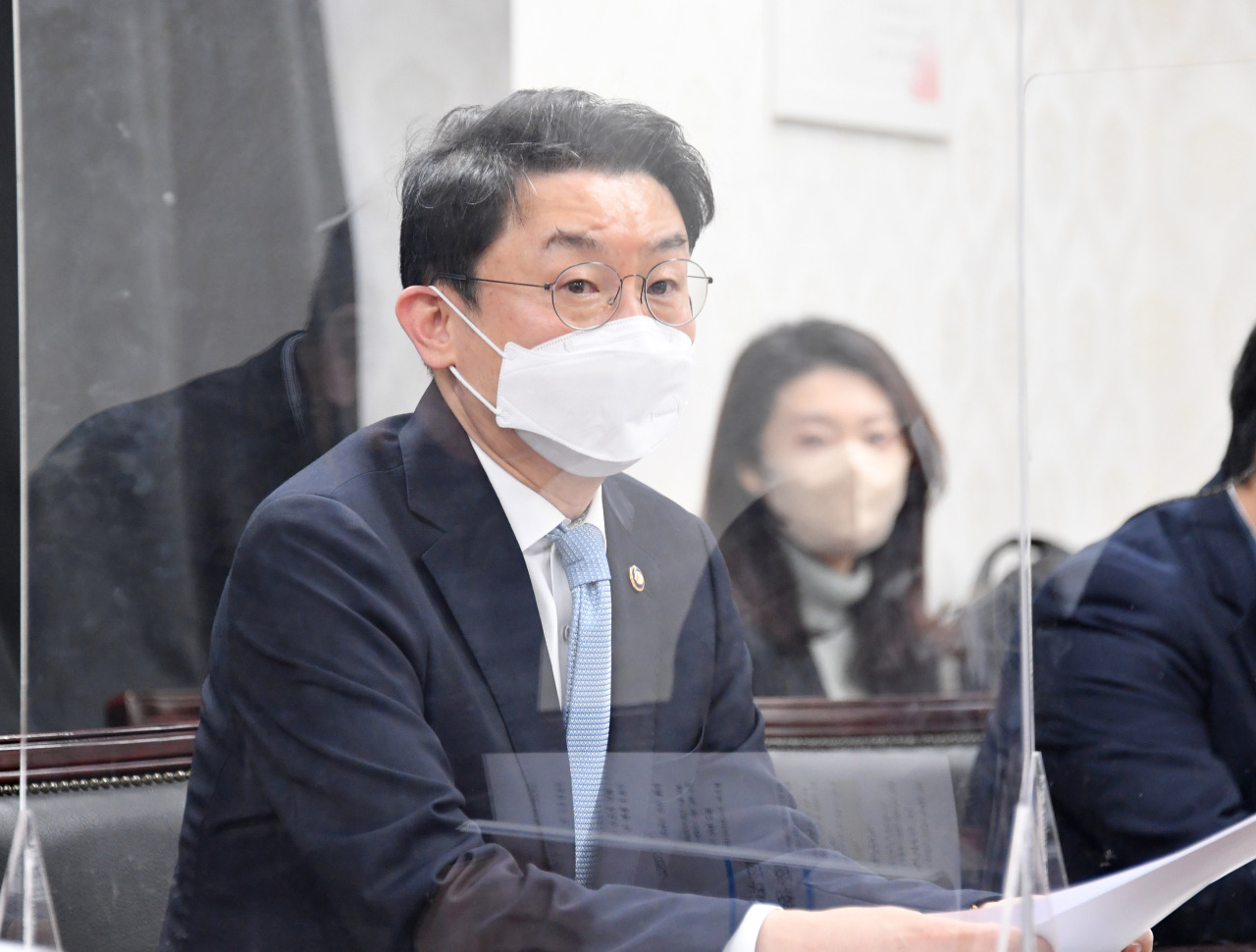
SEJONG -- A longer-than-expected standoff between Ukraine and Russia involving a possible war could deal a severe blow to the Korean economy, Vice Finance Minister Lee Eog-weon said Wednesday.
During a task force meeting in Seoul, Lee said that particular impacts have yet to be seen in the local market at the current stage, despite the escalating tension between the two countries.
“But (worsening geopolitical risk) over a long period would have negative effects on the nation’s overall economy,” he said. For possible impacts, he picked glitches in supply of raw materials from overseas markets, aggravating uncertainty in the financial market and restricting the recovery of the pandemic-hit economy.
“If there are military clashes and ensuing economic sanctions (against an invader) from the global community, it is hard to forejudge the impacts on the economy,” said the vice minister.
He said that as countermeasures, the government is holding daily task force meetings in a bid to monitor impacted sectors including energy, supply logistics and the capital market.
By conducting close investigations into major economic indices, the government will take possible measures immediately by sector, he said.
The government is also considering providing industries with government-reserve petroleum products, should there be difficulties in imports of international crude.
Lee forecasted there would be little problem in ensuring energy supplies for the time being, saying the government secured sufficient supplies of energy and raw materials with long-term contracts, and held a crude stockpile available for 106 days of use.
The government has also increased its stockpiles of feed wheat and corn, which can be supplied until this June or July. Korea partially depends on importing these grains from Ukraine.
The Korean won, despite its losing ground to the US dollar, has traded under 1,200 won against the greenback in recent trading sessions. The benchmark Kospi is maintaining over 2,700 points, though it fell from 2,988.77 in the first trading session of the year.
Exports have also been robust. Following the 15.2 percent on-year growth in January, outbound shipments during the first 20 days of February increased by 13.1 percent.
Meanwhile, the price of gold has continued to climb to trade at 72,696.12 won ($60.9) per gram on Wednesday in the wake of investors’ preference in safe havens, while it traded under 69,200 won in December 2021.
The benchmark gasoline price reached 1,742.49 won per liter, compared with 1,623.79 won on Jan. 1, according to the Korea National Oil Corp.
During a task force meeting in Seoul, Lee said that particular impacts have yet to be seen in the local market at the current stage, despite the escalating tension between the two countries.
“But (worsening geopolitical risk) over a long period would have negative effects on the nation’s overall economy,” he said. For possible impacts, he picked glitches in supply of raw materials from overseas markets, aggravating uncertainty in the financial market and restricting the recovery of the pandemic-hit economy.
“If there are military clashes and ensuing economic sanctions (against an invader) from the global community, it is hard to forejudge the impacts on the economy,” said the vice minister.
He said that as countermeasures, the government is holding daily task force meetings in a bid to monitor impacted sectors including energy, supply logistics and the capital market.
By conducting close investigations into major economic indices, the government will take possible measures immediately by sector, he said.
The government is also considering providing industries with government-reserve petroleum products, should there be difficulties in imports of international crude.
Lee forecasted there would be little problem in ensuring energy supplies for the time being, saying the government secured sufficient supplies of energy and raw materials with long-term contracts, and held a crude stockpile available for 106 days of use.
The government has also increased its stockpiles of feed wheat and corn, which can be supplied until this June or July. Korea partially depends on importing these grains from Ukraine.
The Korean won, despite its losing ground to the US dollar, has traded under 1,200 won against the greenback in recent trading sessions. The benchmark Kospi is maintaining over 2,700 points, though it fell from 2,988.77 in the first trading session of the year.
Exports have also been robust. Following the 15.2 percent on-year growth in January, outbound shipments during the first 20 days of February increased by 13.1 percent.
Meanwhile, the price of gold has continued to climb to trade at 72,696.12 won ($60.9) per gram on Wednesday in the wake of investors’ preference in safe havens, while it traded under 69,200 won in December 2021.
The benchmark gasoline price reached 1,742.49 won per liter, compared with 1,623.79 won on Jan. 1, according to the Korea National Oil Corp.


















![[Today’s K-pop] Treasure to publish magazine for debut anniversary](http://res.heraldm.com/phpwas/restmb_idxmake.php?idx=642&simg=/content/image/2024/07/26/20240726050551_0.jpg&u=)